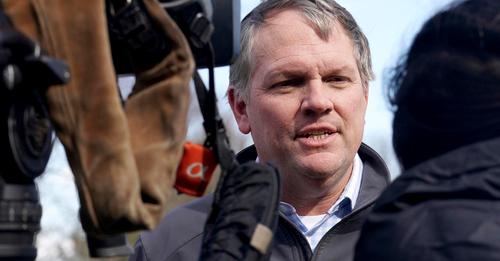In a dramatic turn of events, Norfolk Southern, one of the United States’ leading railway transportation companies, found itself in the midst of controversy when its CEO, Alan Shaw, was suspended. The allegations that led to this suspension involved Shaw’s violation of the company’s strict policies on workplace relationships, specifically with Nabanita Nag, the company’s Executive Vice President of Corporate Affairs and Chief Legal Officer.
This high-profile corporate scandal has sent shockwaves through the business community, raising questions about ethics in leadership, corporate governance, and the challenges of balancing professional and personal relationships in the workplace.
This Blog will delve into the timeline of the events that led to Shaw’s suspension, the implications for Norfolk Southern, and what this case means for corporate America. We will also examine the role of workplace relationship policies, the broader corporate culture, and the expectations placed upon executives in positions of power.
A Brief Background of Alan Shaw and His Tenure at Norfolk Southern
Alan Shaw, a seasoned veteran of the transportation industry, had been with Norfolk Southern for over two decades. He worked his way up the ranks, holding various executive roles before becoming the CEO in early 2020. His leadership was generally well-received, and he was credited with steering the company through some challenging times, including adapting to evolving regulations, technology changes, and the economic impacts of the COVID-19 pandemic.
Shaw was known for his strategic vision and leadership style that focused on fostering innovation, ensuring operational efficiency, and promoting a safety-first culture. His reputation as a strong leader made his sudden suspension all the more shocking.
Nabanita Nag, the other central figure in this story, joined Norfolk Southern in 2018. She was known for her legal acumen, handling the company’s legal affairs and overseeing corporate governance, ethics, and regulatory compliance. Her role was integral to ensuring that Norfolk Southern maintained its reputation as an ethical and law-abiding corporation. Nag and Shaw, in their respective roles, were two of the company’s most prominent figures, and their collaboration on numerous initiatives had always been professional—until the allegations surfaced.
The Incident: A Violation of Corporate Policies
Norfolk Southern, like many major corporations, has strict guidelines concerning workplace relationships, particularly between employees of different hierarchical levels. These policies are in place to prevent potential conflicts of interest, favoritism, or even the perception of impropriety that could damage the company’s reputation or morale among employees.

Shaw’s alleged relationship with Nag directly violated these policies, given their senior positions within the company. While workplace relationships are not uncommon, the added complexity of executive-level involvement requires stringent safeguards to ensure that personal relationships do not influence professional decisions.
The specifics of how the relationship came to light remain unclear. However, internal investigations were launched after rumors began circulating within the company. Employees raised concerns, citing inconsistencies in decision-making processes and potential bias, which could have stemmed from the personal relationship between Shaw and Nag.
As the investigation progressed, it became apparent that Shaw had violated the company’s code of conduct. His suspension was swift, and Norfolk Southern issued a formal statement to its shareholders, employees, and the public, stating that the company takes matters of ethics and compliance seriously, and any breach, regardless of position, would be addressed accordingly.
The Fallout: Repercussions for Norfolk Southern
The suspension of a CEO is a significant event for any company, particularly one as large and prominent as Norfolk Southern. Shaw’s departure, albeit temporary, left the company in a state of uncertainty. His leadership had been instrumental in steering the company through difficult times, and his absence created a power vacuum at the top.
Shareholders were understandably concerned. The stock price of Norfolk Southern saw fluctuations in the days following the announcement, as investors weighed the potential impact of Shaw’s suspension on the company’s future. Trust in the company’s governance was shaken, and there were fears that Shaw’s actions could lead to long-term damage to the company’s reputation.
Internally, employees were divided. Some expressed relief that the company had acted swiftly and decisively, viewing the suspension as evidence that Norfolk Southern was serious about enforcing its policies, regardless of rank. Others, however, were demoralized by the scandal, worried that it could tarnish the company’s image and lead to further instability at the executive level.
Nabanita Nag, though not suspended, also faced scrutiny. As the company’s chief legal officer, her involvement in the situation was seen as particularly problematic, given that she was responsible for overseeing compliance and ethics within the company. There were calls for her resignation, though at the time of writing, she remains in her position.
The Broader Implications: Corporate Governance and Workplace Policies
The suspension of Alan Shaw serves as a cautionary tale for corporate leaders and employees alike. Workplace relationships, especially those involving executives and subordinates, are fraught with risks. Even consensual relationships can give rise to accusations of favoritism, conflicts of interest, or hostile work environments.

Norfolk Southern’s swift action in suspending Shaw sends a clear message: no one, regardless of their position, is above the rules. It also highlights the importance of corporate governance and the need for companies to have clear policies in place that address workplace relationships. These policies are not just about preventing impropriety; they are about safeguarding the integrity of the organization and ensuring that all employees, from the mailroom to the boardroom, are held to the same standards.
Furthermore, this case brings to light the complexities of leadership in the modern corporate world. Executives are not only expected to deliver results but also to embody the values of the company they lead. Any misstep, particularly in the realm of ethics, can have far-reaching consequences.
For Alan Shaw, the suspension marks a significant fall from grace. His future at Norfolk Southern is uncertain, and even if he is reinstated, the scandal will undoubtedly cast a long shadow over his career. For Nabanita Nag, the scrutiny will continue, as questions about her judgment and role in the situation linger.
Corporate Culture and the Future of Norfolk Southern
The impact of Shaw’s suspension goes beyond the immediate fallout. Norfolk Southern must now navigate the challenges of maintaining employee morale, reassuring shareholders, and restoring public trust in its leadership. The company’s board of directors has expressed its commitment to a thorough review of its policies and practices, signaling that reforms may be on the horizon.
One key question that has emerged is whether Norfolk Southern’s corporate culture contributed to the situation. Were there warning signs that were ignored? Did the company’s leadership fail to foster an environment where employees felt comfortable raising concerns? These are questions that the board will need to address as it seeks to move forward.
Moreover, the company will need to consider how it can prevent similar situations in the future. This could involve strengthening its policies on workplace relationships, increasing transparency in decision-making processes, and providing more robust training for employees and executives on ethical conduct.
In the short term, Norfolk Southern’s priority will be finding stability. The company has appointed an interim CEO, but the search for a permanent replacement—or the potential reinstatement of Shaw—will be closely watched by both internal and external stakeholders.
Lessons for Corporate America
The suspension of Alan Shaw is not just a Norfolk Southern story; it serves as a broader lesson for corporate America. In an era where transparency and accountability are paramount, companies must ensure that their leaders are held to the highest ethical standards. This means not only having policies in place but also fostering a culture where those policies are respected and enforced.
Workplace relationships, particularly those involving power dynamics, will continue to be a challenging issue for companies to navigate. The key is ensuring that all employees, regardless of their rank, understand the importance of maintaining professional boundaries and avoiding conflicts of interest.
Corporate leaders, in particular, must recognize that they are not just responsible for the financial performance of their companies; they are also stewards of corporate culture. Any misstep, particularly in matters of ethics, can have far-reaching consequences that go beyond the individual involved.
For Norfolk Southern, the road to recovery will be long, but the company’s swift action in suspending Shaw shows that it is taking the issue seriously. The case also highlights the importance of corporate governance and the need for companies to continuously review and update their policies to reflect the evolving expectations of employees, shareholders, and the public.
Conclusion
The suspension of Alan Shaw, CEO of Norfolk Southern, for violating company policies on workplace relationships, marks a significant moment for the company and for corporate America. It underscores the importance of ethical leadership, the need for clear and enforceable policies, and the challenges of maintaining professional boundaries in the workplace.
As Norfolk Southern navigates the fallout from this scandal, it will need to restore trust among its employees, shareholders, and the public. The company’s handling of the situation will be closely watched, and the lessons learned will likely resonate across the business world.
Ultimately, this case serves as a reminder that no one, not even the CEO, is above the rules. Ethical leadership and corporate governance are not just buzzwords—they are essential to the long-term success of any organization.
Disclaimer:
The information presented in this article is based on publicly available reports and does not imply any judgment or conclusions about the individuals involved. The intent is to provide a general overview of the situation, and the details of the case are subject to further developments and investigations. This article does not intend to defame or malign any individual, and the reader is encouraged to verify the facts through reliable sources.
Images and graphics used are here are publicly available taken from news channel sites and other resources.


